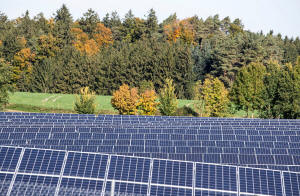Germany's budget crisis leaves struggling solar industry in limbo
 Send a link to a friend
Send a link to a friend
 [December 07, 2023] By
Riham Alkousaa [December 07, 2023] By
Riham Alkousaa
BERLIN (Reuters) - Germany's budget crisis is threatening planned
government support for its domestic solar manufacturers, in what could
prove to be the death knell for an industry that was once world-leading
but got undercut by cheaper Chinese imports.
Europe's biggest economy aims to produce 80% of electricity from
renewable sources but has become increasingly dependent on imported
components such as solar cells from China.
As part of efforts to reduce reliance on China and boost economic
growth, Berlin announced in June plans to support companies that want to
establish or expand solar production capacity in Germany.
Some 2.5 billion euros ($2.7 billion) were envisaged for the program,
half of which was to be provided by the federal government through its
climate transformation fund, Carsten Koernig, head of the German solar
industry federation (BSW), told Reuters.
But last month's constitutional court ruling, banning the transfer of
some 60 billion euros of unused debt to the climate fund puts those
plans in jeopardy.

"The judgment from the court basically has put every commitment on hold
... It couldn't have come at a worst time," an industry source of a
solar company that applied for the aid told Reuters.
With the aim of building an annual production capacity of 10 gigawatts (GW)
in Germany, the economy ministry launched a so-called expression of
interest process to scout for possible flagship projects and more than
two dozen solar hardware firms applied for the program, Koernig added.
Up to five projects should be selected for capital expenditure subsides
but the results, expected to be published late last month, have not been
out yet, three firms that applied for the program told Reuters.
Asked about the court ruling's impact on solar industry government
support plans, an economy ministry spokesperson said they could not make
any precise statements about individual programs as the government was
still examining the court ruling.

The BSW said the budget ruling had also put on hold a decision on a
subsidy it had proposed to parliament to offer incentives to people
installing European-made solar systems.
"I remain confident that there will be a solution here and hopefully it
can be very soon," Koernig said.
[to top of second column] |

A solar power plant with photovoltaic systems is seen near
Schweitenkirchen, north-west of the Bavarian capital Munich,
Germany, October 20, 2021. REUTERS/Lukas Barth

RISING PRICE PRESSURES
Before the court ruling, Germany's solar companies were facing
growing price pressure from their Chinese rivals, forcing them to
sell below production costs, with potential subsidies seen as their
only lifeline.
"The companies that are now being considered (for subsidies) will no
longer exist in six months if you don't solve the problem before
then - this market is being structurally destroyed," said Christian
Kern, a supervisory board member of German solar glass manufacturer
Interfloat.
On Sunday, Sweden's Clean Industry Solutions Holding Europe AB said
its German subsidiary Industrial Solar GmbH would file for
insolvency proceedings, citing a "precarious" situation for European
photovoltaic manufacturers due to a record drop in module prices.
"The problem: under the current conditions, there is no chance of
producing photovoltaic panels, cells and technology in Germany and
making a profit," Kern added.
Edurne Zoco, Executive Director, Clean Energy Technology at S&P
Global, said Europe as a whole has to promote a market for domestic
manufacturers in order to support and grow local production.
"You need to be 100% sure that the products are going to be able to
be sold within the region because you will not be able to export
those products due to international competition."
Brussels and European governments have been mulling tougher action
on clean tech imports as they seek to expand manufacturing in Europe
and reduce the reliance on China for products needed for the green
transition.
But German companies say that many of them don't have the time to
wait for protracted policymaking.
"We're not talking about new investments, we're talking about the
fact that the companies will all stop operations. So I can tell you,
it's really a matter of weeks now and no longer of years," said
Interfloat board member Kern.
($1 = 0.9277 euros)
(Reporting by Riham Alkousaa; editing by David Evans)
[© 2023 Thomson Reuters. All rights
reserved.]
This material may not be published,
broadcast, rewritten or redistributed.
Thompson Reuters is solely responsible for this content. |